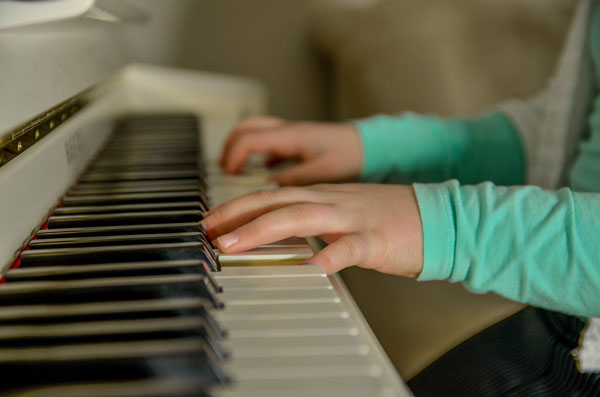
Children's music lessons can often be misunderstood. Many schools devalue the subject and many parents wonder whether or not private lessons are worth it. Whilst in an ideal world it would be unnecessary to pay for music lessons, if that's the option you're faced with, you might wonder about the benefits of tuition. Here, we share 5 ways that children benefit from music lessons, in or out of school.
Intelligence
Plato once said, “I would teach children music, physics, and philosophy; but most importantly music, for the patterns in music and all the arts are the keys to learning.”
Whilst it's undeniably an artistic subject, playing an instrument and understanding music involves a lot of learning that's based on spotting patterns, recognizing links and thinking quickly. It's no surprise that research has shown an increase in IQ and academic performance in children who have formal and frequent music tuition, compared to those who don't. Children who attend music lessons have also demonstrated higher levels of language-based reasoning, an ability to plan and organize events and better short-term memories.
Independent Learning
As well as being good for learning in general, attending music lessons encourages independent learning. There's only so much you can progress in half an hour a week. The rest needs to happen at home.
Practicing, playing, or independently learning – whatever you call it, the results are the same. Children who excitedly get out their instruments and continue to progress in their spare time will foster a love of learning that's not reliant on being overly guided.
Music lessons, especially those incorporating innovative and interactive approaches like the Orff approach, can promote fun and independent learning for children. The Orff approach is a well-established and effective method that encourages creativity and active participation in music. Carl Orff, a German composer, developed this innovative and child-centered music education approach with his colleague, Gunild Keetman, in the early 20th century.
Teachers can tailor the activities to match each child's abilities and interests, ensuring they feel comfortable and supported in their musical journey. Lessons combine singing, movement, percussion instruments, and improvisation, allowing children to engage with music holistically and enjoyably. For this reason, many music schools, such as Wee Make Music, implement the Orff approach.
Passion
This love of learning comes about as a result of a love for the instrument the child is learning to play. It's an exciting time for every child when they first start to make music and if this is encouraged and continued then it will develop into a passion for music and the arts.
All children are passionate, but allowing them to be passionate about an instrument is something that they can hold onto for the rest of their lives. Music lessons can both validate and nurture that passion, which is an important part of living a rich life.
Children with a passion for music may enjoy performing for others, whether singing in front of family members or friends, participating in school music events, or joining local music groups. If your child spontaneously engages in musical play without any prompting, such as creating their songs, melodies, or making up lyrics, it indicates their interest in music.
A child passionate about music may be curious about different instruments, genres, and concepts. They may ask questions about how music works and express a desire to learn more. Learning music can be challenging, but a child with a genuine passion may display resilience and perseverance in overcoming obstacles to improve their musical skills. Therefore, parents must be supportive of their music-passionate children.
For Music's Sake!
Of course, of course, it's all about the children. But what about the flip-side? What about the future of music?
If children's music lessons continue to be undervalued, what will the future look like? It's a serious problem. We all take for granted that there are world-class orchestras and high-quality bands, but how did that happen?
Without a musical education, would-be musicians end up in different professions. And, as Nietzsche once said, “Without music, life would be a mistake.”
Creativity and Expression
Another major benefit of music lessons for children is how they enable creativity and self-expression.
Musical instruments, like paints and paintbrushes or pens and paper, are keys to new artistic creations and expressive messages. It's important to have healthy ways of expressing yourself, and music is one. It can also be entertaining, beautiful, or even political, not to mention the fact that it's the only universal language.
When you think of it like that, it seems absurd to question the value of music lessons for children. What I'd like to know is, are there any disadvantages?



























